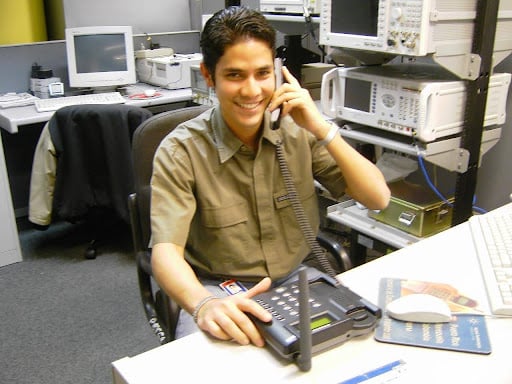Jesus Rodriguez, a highly accomplished Electronic and Telecommunications Engineer with over two decades of experience, is leveraging his vast expertise to address critical needs within the autistic community. Driven by a profound personal experience, Rodriguez has founded Blue Kind Steps, an innovative venture dedicated to developing smart, practical technological solutions for lifetime inclusion and safety for autistic children, teens, and adults.
Rodriguez brings a distinguished career to this new endeavor, known for his pivotal role in enhancing connectivity across Latin America and the United States. His leadership in mobile network projects, spanning GSM, 4G LTE, and 5G technologies, and his collaboration with regulatory bodies like SUBTEL Chile, have significantly expanded telecom infrastructure. An active IEEE member and a Master’s in Leadership candidate, Rodriguez is also a respected educator and thought leader, having delivered keynote presentations and led pioneering Android application development workshops at Venezuelan universities. His commitment to professional growth is underscored by extensive certifications including Cisco’s CCNA, Six Sigma Green Belt, and specialized training in 5G and IoT technologies.
The genesis of Blue Kind Steps is deeply personal for Rodriguez. “Blue Kind Steps began with my family,” he shared. “Twice, my son wandered from home and we had no real-time alerts, no clear protocol, and no way to coordinate help.” This profound experience, coupled with his extensive background in telecom and IoT, fueled his determination. “As an engineer with 20+ years in telecom and IoT, I refused to accept that his future—or any autistic person’s—would be defined by other people’s low expectations. I set out to build practical, scalable tools that support true inclusion across the lifespan—from home to school to work.”
Blue Kind Steps’ core technology is a purpose-built wearable, integrating GPS, LTE-M/NB-IoT, and Bluetooth, designed to pair seamlessly with a dedicated caregiver application. “Our approach is purpose-built for safety and inclusion,” Rodriguez explained. “It supports geofencing, proactive wander (elopement) alerts, and last-known-location sharing with trusted contacts.”
He emphasized the crucial distinction from generic tracking devices: “Unlike general ‘tag’ products, we focus on caregiver workflows, consent, privacy controls, bilingual support, and incident guidance,” with ongoing development for indoor/outdoor reliability using Bluetooth beacons and Wi-Fi SSID signals.
Rodriguez highlighted several smart solutions often overlooked in public spaces, particularly relevant in environments like airports. These include pre-trip “travel profiles” shared with caregivers and airport assistance programs, geofenced “safe zones” with gentle haptic prompts, NFC/QR “help cards” linked to caregiver hotlines with context-specific notes, and wayfinding cues that reduce sensory overload. Blue Kind Steps also advocates for staff micro-training, complementing existing initiatives like the Hidden Disabilities Sunflower by adding actionable tech and caregiver connectivity.
The Blue Kind Steps app serves as the central hub for the entire ecosystem. “The Blue Kind Steps app anchors everything,” Rodriguez confirmed, “real-time alerts, incident playbooks, caregiver handoffs (home ↔ school ↔ work), visual schedules/routines for kids and teens, and workplace supports for adults (task sequencing, communication aids, sensory-aware notifications).”
This comprehensive approach translates into tangible benefits for families, offering “safety & peace of mind,” improved “daily function,” enhanced “access & inclusion” through bilingual UX and affordable tiers, and fostering “dignity & independence” for the individuals it serves.
Concrete examples illustrate its potential: a geofence alert at a theme park triggers a soft alert when a child heads toward an exit, allowing caregivers to see the last-known location and an incident checklist, reducing panic. At school, visual schedules and teacher handoff notes lower transition stress, improving attendance. For adults, task prompts and sensory-aware notifications help an autistic employee complete shift duties, improving performance and retention. “We’re formalizing pilots to publish metrics after launch,” Rodriguez noted.
For emergencies, the platform includes a crucial one-tap “SafeTeam” function. This feature broadcasts a message with live location to trusted contacts, provides a scripted 911 prompt, includes vital medical and communication notes, and assigns roles for a coordinated response. Rodriguez emphasized that the system is “consent-based with privacy controls” and clarifies it is “not a medical device; not a substitute for emergency services.”
Looking ahead, Blue Kind Steps aims for limited pilots in late 2025, a public beta in early 2026, and general availability by mid-2026, contingent on successful partnerships, rigorous testing, and compliance.
Through Blue Kind Steps, Rodriguez is not just building technology; he is crafting a future where innovation empowers autistic individuals and their families to navigate a safer, more inclusive world.

